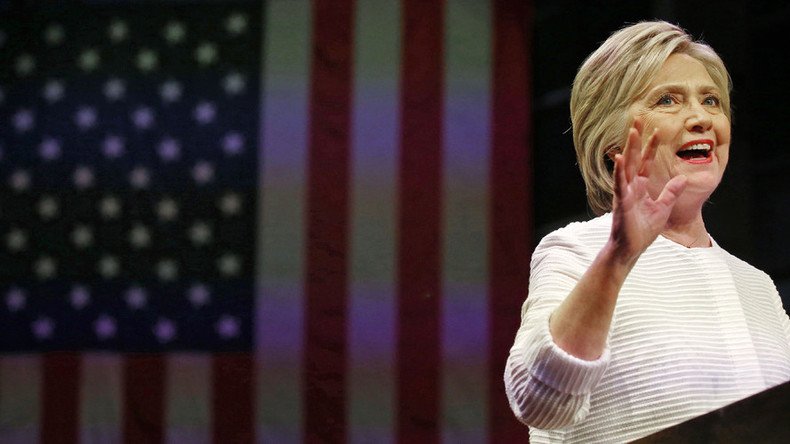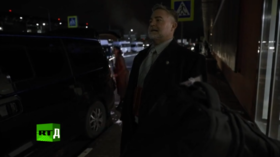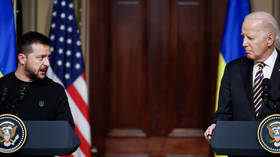‘Corporate-approved candidate’: Chris Hedges rips media coverage of Clinton

Questions are being posed asking whether Hillary Clinton’s campaign and the mainstream media were in collusion or if reporters simply jumped the gun by declaring her the presumptive Democratic nominee the day before six states held primary elections.
The night before voters in California, Montana, New Jersey, New Mexico, North Dakota and South Dakota were due to cast their ballots in the Democratic primary, the Associated Press declared Hillary Clinton the presidential nominee.
Clinton has earned enough delegates to become the presumptive Dem nominee, AP declares https://t.co/icRT4eyZBe | AP pic.twitter.com/4BZLr1ustr
— POLITICO (@politico) June 7, 2016
Likewise on Tuesday night when results were still coming in, Clinton declared herself the nominee when the results for California, where 475 delegates were up for grabs, had not yet been declared.
One of the harsher critics of those events this week is Pulitzer prizewinning journalist Chris Hedges, host of the new RT America show On Contact, who told RT the Associated Press’s Monday report presuming Clinton to be the winner had a “negative effect on the democratic process.”
“I think it is part of a pattern that we’ve seen certainly in the commercial media to marginalize, and at a certain point, especially as the campaign wore on, ridicule the efforts by Bernie Sanders. This is something the Sanders’ camp complained legitimately about for some time,” said Hedges.
“These are corporate-run entities that certainly want to see the corporate-approved candidate, Hillary Clinton, anointed as the nominee,” he continued. “So there is an inbuilt hostility to those who challenge corporate power as Bernie Sanders repeatedly did.”
Recognizing the power of corporate-controlled media is one thing, but determining whether anything can be done to rein in the power and effect of such overt bias and simplistic reporting is something else.
Hedges sees the corrosion of the press as taking place especially over the past decade, from the collapse of newsprint to the point that on the commercial airways there is very little journalism done any more. On top of that, Hedges said there has been “the collapse of public broadcasting.”
“People have robust systems of public broadcasting in order to give space to those not beholden to power elites or commercial or corporate entities,” said Hedges.
“The stripping away of funding, and we should also include the arts here, has reduced public broadcasting to essentially become commercialized. In essence, on PBS we now run commercials, and that has shut out a whole segment of the society that need to be heard. That narrowing of the space within the media has been very detrimental to any kind of rational criticism of the system, and it has affected what is left of our very anemic democracy,” he added.
Journalist raises red flags over possible Clinton-AP collusion [VIDEO] https://t.co/wnA7EJ20r9@real_alexm@kenklippenstein
— RT America (@RT_America) June 8, 2016
Hedges went on to call nightly news broadcasts just one of many revenue streams for large corporations such as General Electric and Viacom. The programming is judged on its ability to attract revenue, which is done by measuring ratings, he said.
“News is not even third or fourth or fifth on their list of priorities.”
Hedges said his RT program On Contact will give space to “the critics of empire, critics of capitalism that within the media landscape in this country do not have a voice.”
RT BernieVolunteer RT RT_America: Clinton was too busy Trump bashing to actually talk about her foreign policy. He… pic.twitter.com/s2W7UL70t3
— Bernie The Best One! (@BernieTheBest1) June 5, 2016
Hedges began his career covering the Falkland War in Argentina for National Public Radio. He spent nearly two decades as a foreign correspondent, reporting from more than 50 countries for a variety of news outlets. In 2002, he was part of a team of reporters from The New York Times awarded a Pulitzer Prize for the paper’s coverage of global terrorism.
On Contact is recorded at RT’s New York bureau and will first air on Saturday, June 11.
In the first episode of On Contact, Hedges discusses the global revolt against corporate capitalism with radical intellectual and author, Tariq Ali.












